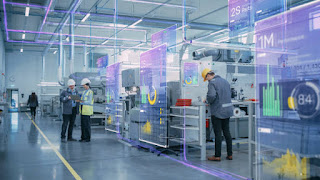The Future is Now: Harnessing the Power of Artificial hi Intelligence
should go into depth about how AI affects industries and finally into day-to-day life in common living settings. AI is no longer an ambiguous fantasy but a reality working its way through the now and into the future. Here are a few areas where AI is definitively shaping the world today:
1. Automation and Efficiency
2. AI in Healthcare
3. Smart Cities and Infrastructure
4. Customer Service and Personalization
It's a new definition of customer service with the use of chatbots, virtual assistants, and recommendation engines. AI imparts an added value experience to a customer through perfect recommendations and 24/7 support at each step of decision-making. It can even understand the language it should be programmed in and learn through machine learning AI
5. AI in Creative Fields
AI has now found its own space in the creative industry where it is used to create music, art, and literature. Artists are now collaborating with AI in order to invent newer modes of expressions whereas businesses will only continue to use it in writing copy in advertisements for marketing products as well as to script movies.
6. Ethical and Social Issues
However, with all the great promises, AI raises essential ethical concerns. Critical matters to be addressed include data privacy and surveillance, displacement of jobs, and bias in decisions.
It is very important how responsibly AI is adopted and designed into society.
7. Workforces of the Future
Needless to say, jobs would change entirely with AI. Routine jobs and complex ones would be carried out totally or partially by the machines, and novel jobs will emerge in technology, artificial intelligence development, and oversight of ethics. The future workforce would have to learn through trainings in new skills: Creativity, critical thinking, and emotional intelligence—areas of which human beings have a superior advantage over the machine.
Conclusion
It is only at this point that the potential of AI today can be unleashed against sheer scale in comparison with socio-economic, ethical, and economic challenges imposed by AI. Such responsible use of AI encourages innovation and improvement in the quality of human life and tackles humanity's most pressing and complex global challenges.






.jpeg)

.jpeg)






0 Comments